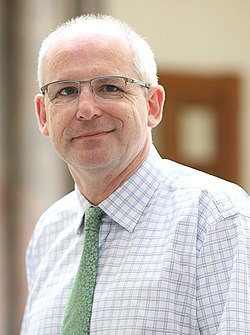| Governor of Saint Helena | |
|---|---|
 Coat of arms of Saint Helena | |
 Standard of the Governor of Saint Helena | |
| Style | His Excellency |
| Residence | Plantation House, St Helena |
| Appointer | Monarch of the United Kingdom |
| Term length | At His Majesty's pleasure |
| Formation | 1659 |
| First holder | John Dutton |
| Website | Government of St Helena |

The Governor of Saint Helena is the representative of the monarch in Saint Helena, a constituent part of the British Overseas Territory of Saint Helena, Ascension and Tristan da Cunha. The governor is appointed by the monarch on the advice of the British government. The current governor of Saint Helena has been Nigel Phillips since 13 August 2022.
Contents
- Acting governor and the governor's deputy
- List of governors of Saint Helena
- East India Company governors
- British Crown governors
- See also
- References
- External links
The role of the governor is to act as the de facto head of state and commander-in-chief of Saint Helena. The governor's responsibilities include internal security, external affairs, the administration of justice, finance, shipping and employment, as well as disciplinary action in respect of any public officer. The governor appoints the Chief Minister of Saint Helena and four other members of the Executive Council; the officeholder, with some exceptions, is bound to seek and act in accordance with their advice.
The governor is based on Saint Helena and appointed by the British Foreign, Commonwealth and Development Office. The governor also appoints three members to Saint Helena's Executive Council (the balance being popularly elected)
The governor's flag in Saint Helena is the Union Flag defaced with the territory's coat of arms. The official residence, Plantation House, is located near the capital Jamestown. The Governor's Office is located within The Castle, along with the office of the chief secretary of Saint Helena, who runs the day-to-day administrative part of the government.
Prior to 2009, Ascension and Tristan da Cunha were dependencies of Saint Helena and therefore directly represented by the Governor of Saint Helena. The St Helena, Ascension and Tristan da Cunha Constitution Order 2009 made Saint Helena, Ascension, and Tristan da Cunha equal constituent parts of the territory. Each constituent part has its own government; however, the constitution order states that the Governor of Saint Helena is ex officio also the Governor of Ascension and the Governor of Tristan da Cunha. [1]

